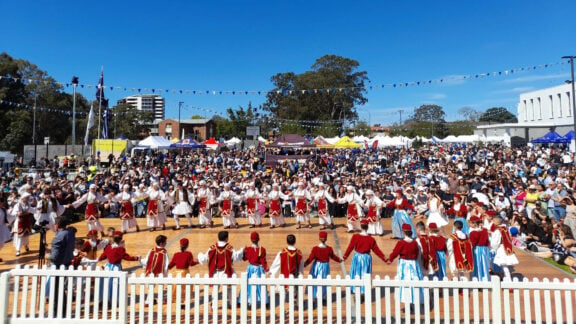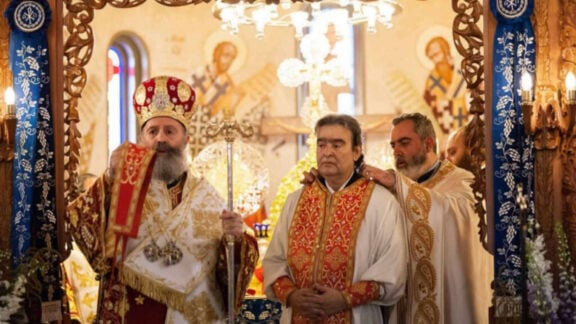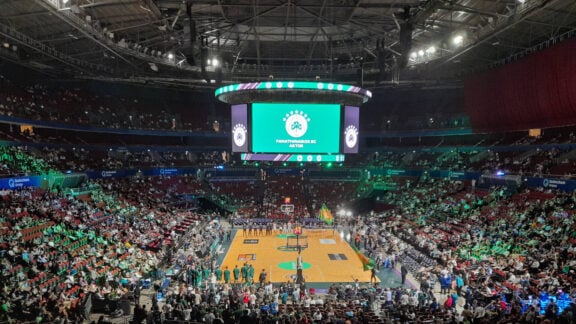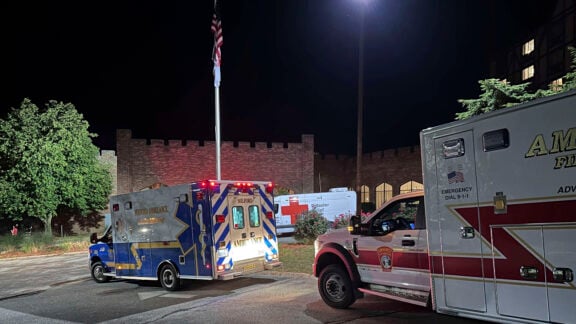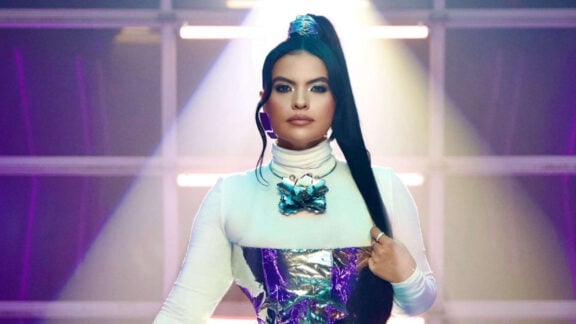The Australian Bureau of Statistics (ABS) 2021 census has revealed that Greek is still in the top ten languages spoken other than English and one of the largest cultural ancestries in Australia with over 400,000 people identifying as Greek. This is an increase since 2016.
What is also constant since the colonial period is migration’s role as the key source of Australia’s population growth. According to the Home Affairs’ site, the Australian Government plans to increase migration level for the 2022-23 permanent Migration Program to 195,000 places after two years of no migration due to the Covid pandemic.
Up to two million immigrants arrived on our shores in the aftermath of World War II and in that wave of mass migration 160,000 Greeks arrived After World War II and the Greek Civil War that followed, that does not include thousands of Greeks from Egypt, Cyprus, and Turkey.
The majority of Greek immigrants arriving after World War II worked in factories or farms as unskilled or semi-skilled labour – even educated migrants were forced to settle for manual jobs.
The renowned Australian urban sociologist I. H. Burnley wrote in the 1970s that the Greek community had reached an extraordinary level of institutional completeness. In other words, Greeks within the first few years of settlement developed their community structures, language schools, churches, welfare agencies, and media outlets developed, (Neos Kosmos began in 1957).
The population of Melbourne eventually constituted one of the largest Greek settlements in the world outside of Greece. Politicians often cite the well-worn cliché that Melbourne is the largest Greek city outside Greece – however we decided to look at the figures to try and work out how many Hellenes, or those that identify as a Hellenes, live in Australia.
Key points:
– Greek ancestry is in the top 10 of ancestries shared by people living in Australia
– Out of over 400 languages spoken in Australia, Greek features in the seventh place (even higher in some states)
– Most Modern Greek speakers were born in Australia but their numbers have slightly reduced since 2016
– There is drop in numbers of Greek speakers born in Greece or Cyprus compared to 2016
– Victoria remains a Greek stronghold being home to the majority of Australia’s residents identifying as having Greek ancestry. Greek language is also ranked as the third most commonly spoken language other than English in the state.
Ancestry
As of 2021, more than 300 different ancestries were reported in Australia.
There were 424,744 people identifying as being of Greek ancestry and 40,091 identifying as Cypriot.
Numbers have increased steadily since 2016 (397,433 – 28,891) and previously 2011 (378,270 – 22,680).
Greek – One in the 10 most common ancestries declared in Australia.
Ancestry is considered an important marker of Hellenism, particularly as birthplace as a criterion does not tell a full story. Ancestry relates to the cultural, ethnic and linguistic group an Australian identifies with.
According to the ABS , “the ancestry question captures information that can provide a good indication of a person’s ethnic background when used together with other variables.”
It should be noted that the Census asks people to provide up to two ancestries.
Greek ancestry 2021 breakdown per state/territory
VIC: 181,184
NSW: 141,627
SA: 40,704
QLD: 32,702
WA: 16,117
ACT: 5,533
NT: 4,271
TAS: 2,602
Cypriot ancestry 2021 breakdown per state/territory
VIC: 16,514
NSW: 14,902
QLD: 3,371
SA: 3,561
WA: 875
ACT: 401
NT: 319
TAS: 160
Country of Birth
Out of the country’s population of 25,422,788 a total of 8,402,973 have been born overseas, while almost half of Australians (48.2 per cent) have a parent born overseas.
India is the third largest country of birth after Australia and England.
According to the 2021 Census only 92,314 Greeks were born overseas. This is lower than 2016 (93,740) and 2011 (99,938).
The overwhelming majority of those born in Greece, 94.8 per cent are Australian citizens.
A total of 16,737 were born in Cyprus, also slightly reduced from the previous two censuses (16,936 in 2016 – 18,070 in 2011).
A round eight per cent of Greek-born migrants living in Australia are recent arrivals having settled in Australia after 2001. The Greek Financial Crisis of 2010-2017 also saw an increase of Greeks – many Australia born – returning to Australia.
Language
The number of people who used a language other than English at home increased by nearly 800,000, that is over 5.5 million people. Punjabi is the fastest growing language in Australia given that South Asian migrants constitute one of the largest immigrant groups in Australia over the last 10 years.
Greek remains high in the ranking of most spoken languages in the country regardless of a reduction of by 8,000 between 2016 and 2021,
Greek takes up the seventh place as following English, Mandarin, Arabic, Vietnamese, Cantonese and Punjabi.
There was a marked drop in the number of new arrivals of Greek speakers in Australia in 2021 due to Covid pandemic border closures.
Just 80 Greek speakers arrived in the country during the Census year, in stark contrast to the almost 1,200 and 1,400 that arrived in 2013 and 2012 respectively due to Greece’s financial crisis.
Data may reveal an increase of Greek speakers in the second and third generation Greek Australians, given that the number of people identifying as Greek speakers and of Australian ancestry rose to 17,047 in 2021, up from 12,770 back in 2016.
Of those stating to be Greek speakers as of 2021, a total of 129,484 were born in Australia, 78,377 in Greece and 9,908 in Cyprus.
The overwhelming majority of Greek speakers and 96.6 per cent are Australian citizens.
Australia’s Greek burbs
Melbourne’s Oakleigh and Sydney’s Marrickville are often considered the two main Greek Australian hubs but the numbers tell a different story.
According to the 2021 Census , the biggest concentration of Greek speakers in Australia is found in the southern Sydney suburb of Earlwood, 3,272, followed by Reservoir in Melbourne’s north 2,614.
Top 10 suburbs of Greek speakers in Australia
1. Earlwood (NSW) 3,272
2. Reservoir (VIC) 2,614
3. Kinsgrove (VIC) 1,966
4. Preston (VIC) 1,919
5. Marrickville (NSW) 1,849
6. Bentleigh East (VIC) 1,839
7. Belmore (NSW) 1,709
8. Mount Waverley (VIC) 1,684
9. Northcote (VIC) 1,640
10. Doncaster (VIC) 1,551
The relevance of these numbers
Diversity has become more important than ever in policy settings, however, it is a common narrative that Greeks have become ensconced in the mainstream. Too often the catchall phrase ‘European’ is used to also include Greeks. In reality Greeks were not seen as Europeans until well after World War II, the racism, the hardship and intergenerational impact of migration is not considered.
True, many Greek Australians are represented in business, law, medicine and government. However, as diversity is increasingly defined by colour and gender, the needs of Australia’s large Greek speaking population need to be considered in areas of welfare, health and language services.
The Covid death toll of older Greeks, which according to the ABS was 8.1 percent higher than those born in Australia is a cruel example of the fact that multicultural health communications tailored to older Greeks and their middle aged children was largely absent in the first Covid wave.
In terms of Languages other than English (LOTE), taught at schools, Greek while being in the top ten LOTE has very limited profile in state schools, many of them in areas of high Greek concentration.
In terms of cultural policies Australia’s arts funding bodies now forget Greek festivals dance groups, music groups, and cultural committees – now led by second and third generation Greek Australians, regardless of the fact that festivals like Melbourne’s Antipodes is still one of the largest cultural festivals in Australia.
The Census and the numbers it reveals should assist in the design of more inclusive government policies across aged care, mental health, and culture and the arts, that account for the large number of Greek Australians.



